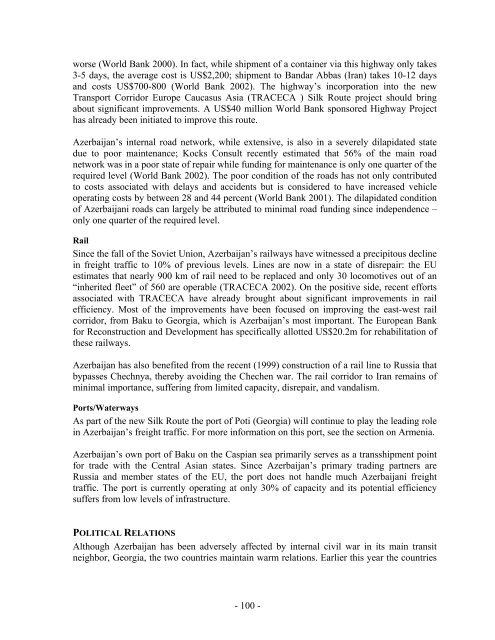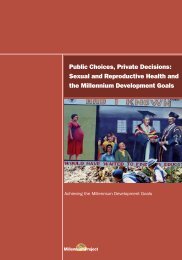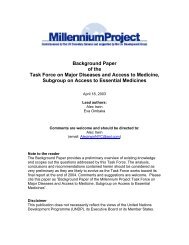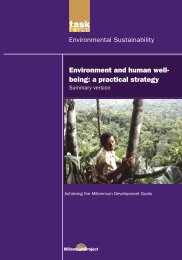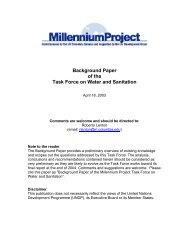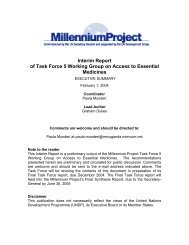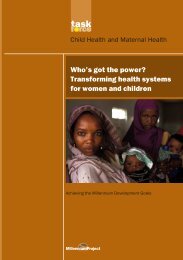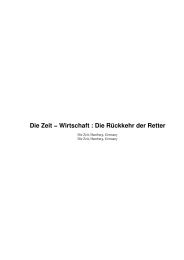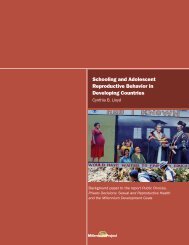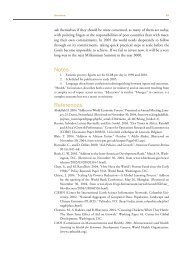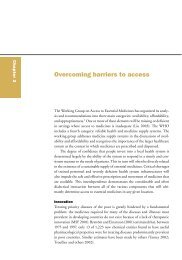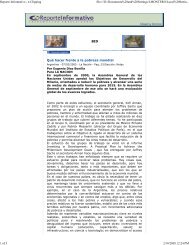the challenges facing landlocked developing countries: a case study ...
the challenges facing landlocked developing countries: a case study ...
the challenges facing landlocked developing countries: a case study ...
Create successful ePaper yourself
Turn your PDF publications into a flip-book with our unique Google optimized e-Paper software.
worse (World Bank 2000). In fact, while shipment of a container via this highway only takes<br />
3-5 days, <strong>the</strong> average cost is US$2,200; shipment to Bandar Abbas (Iran) takes 10-12 days<br />
and costs US$700-800 (World Bank 2002). The highway’s incorporation into <strong>the</strong> new<br />
Transport Corridor Europe Caucasus Asia (TRACECA ) Silk Route project should bring<br />
about significant improvements. A US$40 million World Bank sponsored Highway Project<br />
has already been initiated to improve this route.<br />
Azerbaijan’s internal road network, while extensive, is also in a severely dilapidated state<br />
due to poor maintenance; Kocks Consult recently estimated that 56% of <strong>the</strong> main road<br />
network was in a poor state of repair while funding for maintenance is only one quarter of <strong>the</strong><br />
required level (World Bank 2002). The poor condition of <strong>the</strong> roads has not only contributed<br />
to costs associated with delays and accidents but is considered to have increased vehicle<br />
operating costs by between 28 and 44 percent (World Bank 2001). The dilapidated condition<br />
of Azerbaijani roads can largely be attributed to minimal road funding since independence –<br />
only one quarter of <strong>the</strong> required level.<br />
Rail<br />
Since <strong>the</strong> fall of <strong>the</strong> Soviet Union, Azerbaijan’s railways have witnessed a precipitous decline<br />
in freight traffic to 10% of previous levels. Lines are now in a state of disrepair: <strong>the</strong> EU<br />
estimates that nearly 900 km of rail need to be replaced and only 30 locomotives out of an<br />
“inherited fleet” of 560 are operable (TRACECA 2002). On <strong>the</strong> positive side, recent efforts<br />
associated with TRACECA have already brought about significant improvements in rail<br />
efficiency. Most of <strong>the</strong> improvements have been focused on improving <strong>the</strong> east-west rail<br />
corridor, from Baku to Georgia, which is Azerbaijan’s most important. The European Bank<br />
for Reconstruction and Development has specifically allotted US$20.2m for rehabilitation of<br />
<strong>the</strong>se railways.<br />
Azerbaijan has also benefited from <strong>the</strong> recent (1999) construction of a rail line to Russia that<br />
bypasses Chechnya, <strong>the</strong>reby avoiding <strong>the</strong> Chechen war. The rail corridor to Iran remains of<br />
minimal importance, suffering from limited capacity, disrepair, and vandalism.<br />
Ports/Waterways<br />
As part of <strong>the</strong> new Silk Route <strong>the</strong> port of Poti (Georgia) will continue to play <strong>the</strong> leading role<br />
in Azerbaijan’s freight traffic. For more information on this port, see <strong>the</strong> section on Armenia.<br />
Azerbaijan’s own port of Baku on <strong>the</strong> Caspian sea primarily serves as a transshipment point<br />
for trade with <strong>the</strong> Central Asian states. Since Azerbaijan’s primary trading partners are<br />
Russia and member states of <strong>the</strong> EU, <strong>the</strong> port does not handle much Azerbaijani freight<br />
traffic. The port is currently operating at only 30% of capacity and its potential efficiency<br />
suffers from low levels of infrastructure.<br />
POLITICAL RELATIONS<br />
Although Azerbaijan has been adversely affected by internal civil war in its main transit<br />
neighbor, Georgia, <strong>the</strong> two <strong>countries</strong> maintain warm relations. Earlier this year <strong>the</strong> <strong>countries</strong><br />
- 100 -


